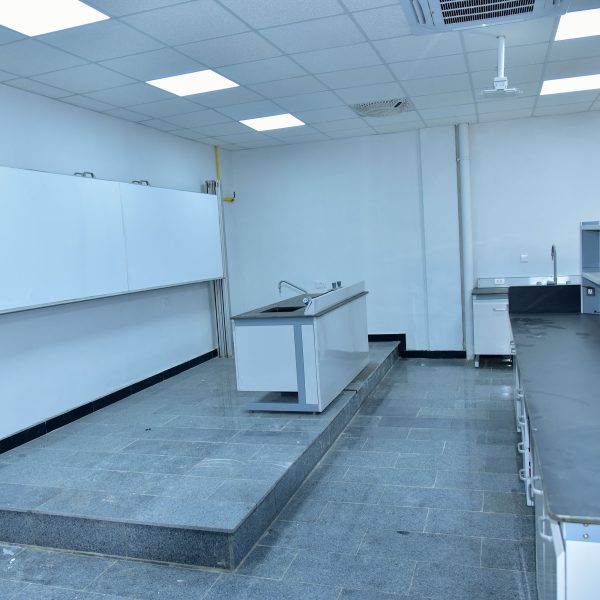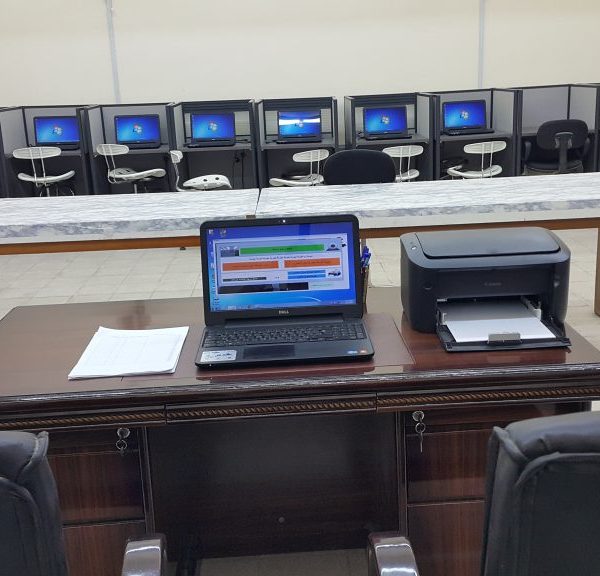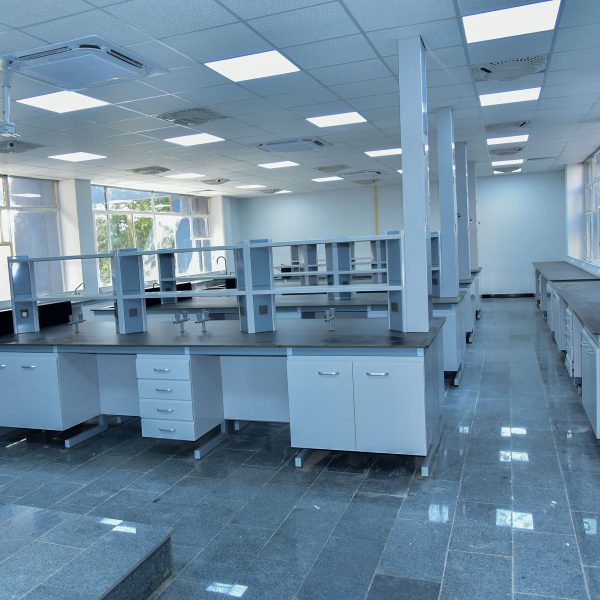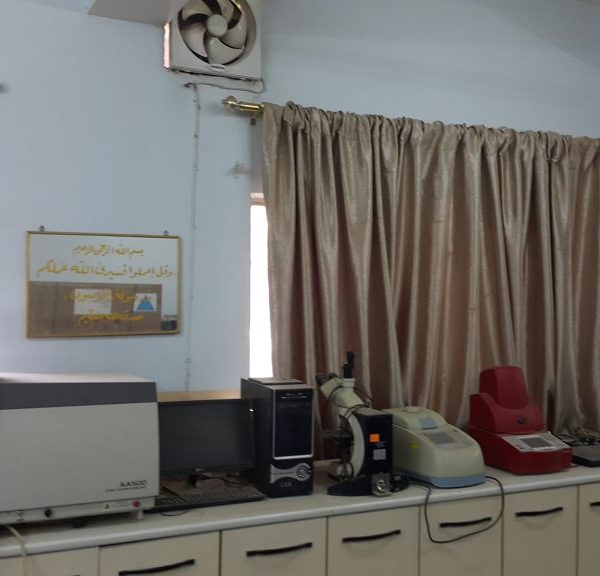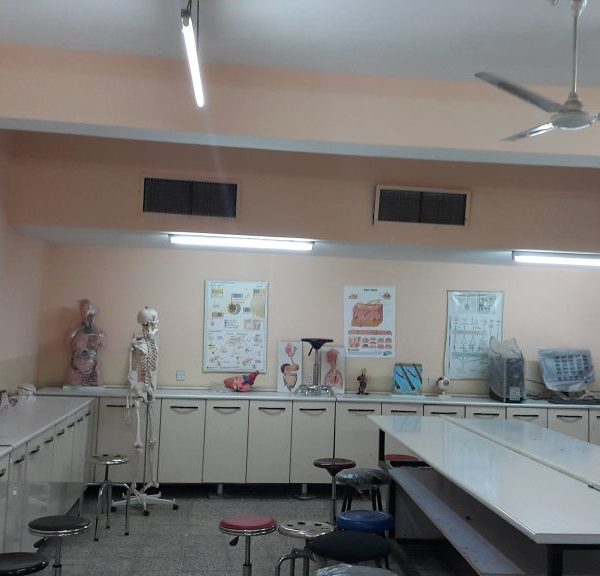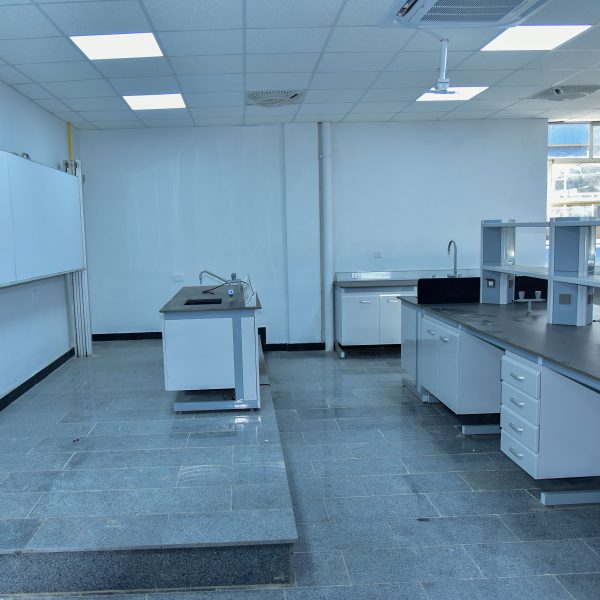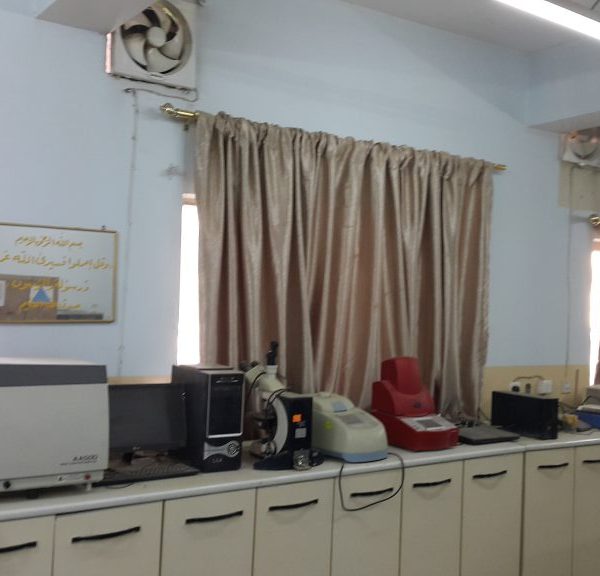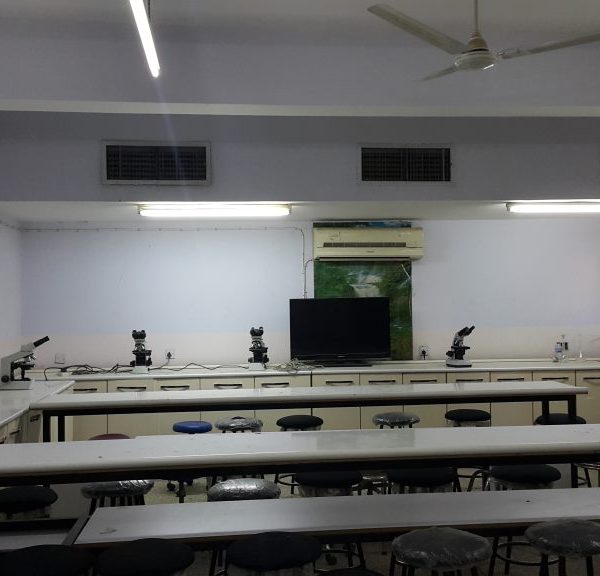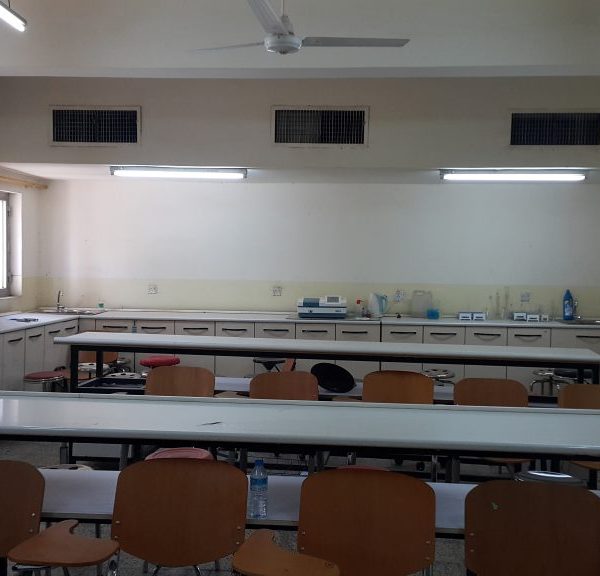Biology Laboratory
Overview: Biology is one of the fundamental sciences important for students in pharmacy colleges and related fields. The study of biology encompasses various forms of life among different organisms and their mutual relationship with the surrounding environment. Comparative basic organ function, introduction of students to the principles of natural biological function in a wide range of living organisms. Objectives of the Laboratory: At the end of the semester, students should be able to acquire the basic knowledge and skills in biology and the evolution of living organisms and their vital activities.
Histology Laboratory
Overview: Histology is a branch of biology that studies microscopic anatomy of tissues. It is the microscopic counterpart to gross anatomy, which looks at larger structures visible without a microscope. While one can divide microscopic anatomy into organology, the study of organs, and histology, the study of tissues, modern usage places these topics under the field of histology. Objectives of the Laboratory: The main goal of histology is to determine how tissues are organized at all levels of structure, from cells and the substances between cells to organs. The study of tissues aims to introduce students to the various body systems and to define their knowledge of the histological components of different organs.
Pathophysiology and Human Anatomy Laboratory
Pathophysiology Laboratory :Overview: The Clinical Pathophysiology Laboratory is a place for conducting all scientific experiments to obtain a specific result that provides a precise description of the body’s organs, systems, and functions at the cellular level. It studies mutations, diseases, infections, and tissue necrosis for each organ and system. The purpose of clinical pathology is to identify the cause of discomfort in the human body. The laboratory serves as a hub for all scientific experiments aimed at obtaining specific results.
Objectives of the Pathophysiology Laboratory:
- Graduate Competence: Ensure that graduates are proficient in working in educational laboratories in addition to their profession as pharmacists.
- Community Interaction: Enable graduates to interact with all segments of society. The laboratory aims to achieve excellence in education and be complementary to other laboratories in the college, providing students with what they need for programming their future within health institutions and hospitals, based on their connection with laboratories, higher education, and clinical research.
Anatomy Laboratory
Overview: This laboratory complements the study of histology to understand the distribution of organs in the human body and link it with histological knowledge determined by the light microscope. Objectives of the Anatomy Laboratory: The laboratory aims to make the graduate capable of dealing with all segments of society. It aspires to reach a level of excellence in education, with the goal of being complementary to other laboratories in the college, such as the histology laboratory and the physiology laboratory. The laboratory provides what the student needs during their study period to program them for the future within health institutions and hospitals. This includes knowledge of the human body’s locations in the chest, abdomen, extremities, and head. The study also involves understanding the organs of the body in general and the distribution of their accessories using anatomical models, graphic slide displays (data show), and video films.
Biochemistry Laboratory
Overview: Biochemistry is a branch of the natural sciences that specializes in studying the chemical composition of cell components in various living organisms, such as humans. Biochemistry is the intersection of chemistry and biology. It has three main branches: structural biology, enzymology, and metabolism (the science of building processes in the body). Objectives of the Biochemistry Laboratory: The laboratory aims to study the quantitative and qualitative analysis of basic substances in food, such as proteins (amino acids), carbohydrates (monosaccharaides, disaccharides, and complex carbohydrates), and fats (fatty acids). It also examines how these primary structures are absorbed by the digestive tract or reabsorbed from the renal tubules. The second part of the study involves the analysis and detection of these factors using precise analysis and determining their concentration using an electric spectrophotometer. The results are then discussed to determine if there is a medical condition, whether the levels are higher or lower than normal. Further discussion of medical conditions, hormonal disorders, or the study of enzymes is covered in clinical chemistry to diagnose the type of disease.
Microbiology and Parasitology Laboratory
Microbiology Laboratory Overview: The Microbiology and Immunology Laboratory teaches microbiology and immunology, studying the body’s ability to build defenses against infectious microbes. Medical microbiology (or clinical microbiology) studies the role of microbes (bacteria) in human diseases of all kinds. It includes studying the causative agents of microbes, epidemiology, and is related to studying diseases and immunology. Environmental microbiology includes studying viruses or microbes, fungi and their types, as well as parasitic microorganisms that transmit diseases. Objectives of the Microbiology Laboratory: The Microbiology and Parasitology Laboratory aims to introduce second-year pharmacy students to pathogenic bacteria that affect humans, causing infectious diseases ranging from mild to severe and life-threatening. It covers methods of infection transmission to humans, the diseases they cause, how to diagnose them in the laboratory, the antimicrobials and drugs used in their treatment, and methods of prevention.
Parasitology Laboratory
Parasitology Laboratory Overview: This laboratory aims to familiarize students with various parasites that affect humans, including how they are transmitted, the diseases they cause, laboratory diagnostic methods, prevention strategies, and drugs used in their treatment.
Objectives of the Parasitology Laboratory:
- Introduction to Microorganisms: Familiarize students with microorganisms such as bacteria and parasites and the precautionary measures in the laboratory, including both biological and chemical risks.
2.Microscopic Observation and Diagnosis: Teach how to observe and diagnose microorganisms in the laboratory using various methods, including both morphological and biochemical characteristics.
- Sterilization and Cultivation: Instruct on the sterilization of tools, devices, and culture media in the laboratory and how to cultivate microorganisms.
4.Identification of Microorganisms: Introduce different forms and groups of microorganisms.
- Biochemical Activities Study: Study the biochemical activities of bacteria and utilize them to differentiate between different species.
- Parasite Life Cycle: Study the life cycle of important parasites causing common diseases in humans and understand how they are transmitted from the external environment to humans.
- Laboratory Diagnostic Methods: Learn important laboratory methods for diagnosing parasites.
- Prevention and Control: Understand methods for preventing and controlling parasites, types of control, and their effectiveness.
- Anti-parasitic Drugs: Acquire knowledge about drugs effective against parasites.
Clinical Chemistry and Medical Physics Laboratory
Clinical Chemistry Laboratory Overview: This laboratory, currently under high development, performs precise monitoring and control of high-quality systems in various biochemical tests, falling under the discipline of clinical chemistry.
Objectives of the Clinical Chemistry Laboratory: 1. Graduate Competence: Ensure that the graduate is familiar with the study of endocrinology and immunology. 2. Scientific Knowledge: Acquire sufficient scientific knowledge in the field of pathological chemical analysis in the human body and study the quality control in the living organism. These laboratories play a crucial role in providing students with hands-on experience, reinforcing theoretical knowledge, and preparing them for future professional practice in healthcare institutions.
Medical Physics Laboratory
Medical Physics Laboratory Overview: In the Medical Physics Laboratory, students are introduced to measurement devices, precision calculations, and error ratios in the apparatus. It covers topics in medical physics, such as the flow of fluids through capillary tubes, viscosity measurement, surface tension, and the measurement of sound velocity. Additionally, experiments in optics and lasers are conducted, emphasizing their importance in medical applications. The laboratory aims to underscore the significance of direct observation in physics, differentiating between theory-based conclusions and experimental results.
Objectives of the Medical Physics Laboratory: The primary objectives include training students to understand the fundamental principles and practical concepts of physics relevant to their theoretical studies. The laboratory aims to develop practical skills, focus, and confidence in students, raising their scientific and laboratory competence. The goal is to equip students with the skills necessary to handle scientific problems, conduct research, and succeed in their academic endeavors.
Computer Laboratory
Vision: The Computer Laboratory provides practical sessions for the computer science course, covering essential skills in computer systems, internet usage, and Microsoft Office applications. Objectives of the Computer Laboratory: The Computer Laboratory strives to prepare graduates capable of efficiently dealing with applied software. It works towards providing suitable opportunities for developing the community’s capabilities in utilizing advancements in information technology. The laboratory aims to cultivate applied tendencies in students, enabling them to develop self-skills in their higher studies and acquire the necessary skills to tackle scientific problems.
Clinical Laboratory Sciences/Postgraduate Studies Laboratory
Overview: The laboratory’s purpose is to prepare skilled pharmacists capable of finding solutions to various challenges they might encounter. The objectives include raising scientific and professional levels, graduating competent pharmacists capable of contributing scientifically and practically to educational and healthcare institutions. Objectives of the Laboratory: The Clinical Laboratory Sciences/Postgraduate Studies Laboratory aims to provide opportunities for postgraduate students (diploma, master’s, and doctoral) to work independently from other students. The researchers and faculty aspire to translate scientific ideas into practical, applied research that can be utilized in clinical diagnosis, disease progression monitoring, treatment evaluation, and impact assessment on biochemical indicators.


